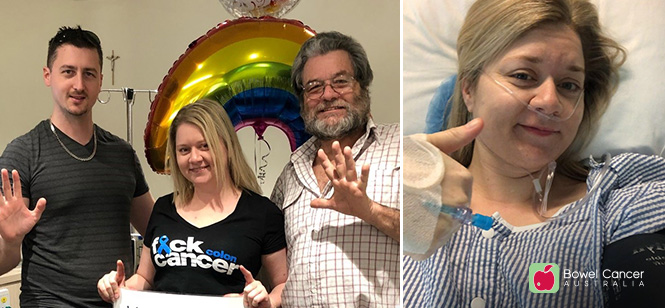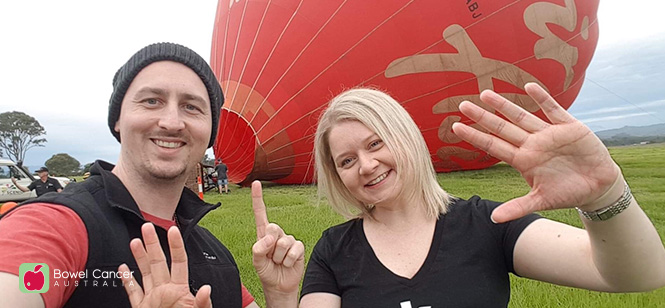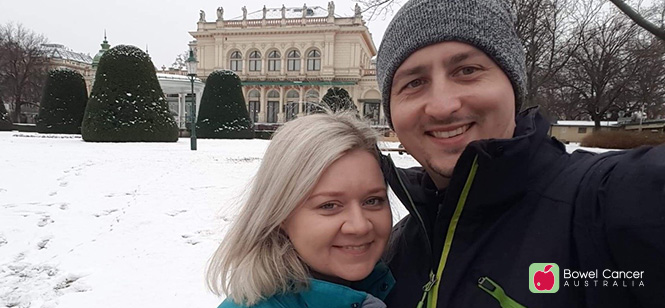I’m Kat, a 34 year old woman who was diagnosed with stage 3 bowel cancer at age 33.
I have completed treatment and have returned to work part time as a training surgeon. I am slowly navigating through life post treatment where some days you feel grateful to be on the other side of treatment, and same days feeling guilty that others didn’t get the same luck as what you were given. I think I now have an overwhelming amount of sympathy for my patients.
2018 changed my life forever. Despite the life-threatening phrase ‘Unfortunately I found a cancer’, I know I’ve had the privilege of many silver linings. Any cancer patient will tell you that after diagnosis, nothing is ever the same. Some parts of your life resemble what you know and others, completely different.
April 20th, 2018 is when I took the day off work to have a colonoscopy. I had only ever had a few days of sick leave in seven years prior to this. I had decided that my persistent rectal bleeding for more than six weeks required investigation. Unlike most people, I rang a mentor of mine (a colorectal surgeon) and scheduled a visit. She agreed I needed the colonoscopy however, neither of us were overly alarmed.
I was healthy, with no risk factors and felt great. I was well on my way to becoming a surgeon myself. I was enjoying life, travelling overseas, active and the happiest I had been in years. I had spent the last few years enjoying life in North Queensland. I was working back in a big centre hospital again and closing in on my final exams to be a consultant surgeon. I even had an interest in colorectal surgery.
When I was told I had cancer I don’t think I was surprised, as it made sense with some bleeding and bowel habit change. However, I know I sat there for a long time wondering how.

I then had my first MRI and CT scan to complete my staging. I spent the first week contemplating whether I required radiation. The final decision that anatomically, the tumour was just too high to be recommended for radiation.
I was Stage 3, which meant that it had not metastasised. My first lucky break was that it was treatable. My second was that I did not need radiation.
At 33 I was suddenly completing a will, Advanced Health Directive and Enduring Power of Attorney. This was incredibly confronting.
One week in I had my anterior resection. It went remarkably well, and I was so grateful for my excellent care. I then got my formal staging with pathology. I had some nodal involvement and it was also confirmed that this was a sporadic cancer with nothing to blame. The weeks following this I had to access IVF to store embryos as even at my age, I hadn’t even thought about having a family yet. I love my career too much and was just enjoying life as it was, I was certainly not unhappy.
The day after the egg pick up I started chemotherapy. I had signed up for 6 months of FOLFOX. The concoction of medications meant that I was having 12 cycles every second week for the six months. For better or worse, I knew too much. I knew the figures, the chemotherapy regime, the operation. I’ve even performed it myself. Every decision that had to be made I was making it with the same materials, research and knowledge that my doctors were also accessing. To stop it from becoming overwhelming I could only think about the next step, even in really small stages.
One night I went down the rabbit hole of reading too much and woke my partner at 4am. He bundled me up, took me out to watch the sunrise while eating cheeseburgers. He was a rock. He took it all in his stride. One silver lining of my diagnosis was the strength it bought to my relationship. We hadn’t really been dating that long.

It was devastating to know that the likelihood of having peripheral neuropathy from my chemotherapy was approaching 100%. The degree of this was however, unknown. The effect that this might have on my chosen career might mean that I was now unable to be a surgeon. I said early on that my health mattered so much more and that anything I could salvage after treatment was really a bonus.
I recall being told some side effects of chemotherapy. Other than peripheral neuropathy, FOLFOX was likely to have ‘hair thinning’ and gastrointestinal upset. What I learned was that it wasn’t the type of side effect, or number, it’s the qualitative nature of it that counted.
Some ‘gastrointestinal upset’ is very different to crying on the floor of the shower rotating each buttock on the ground as you can’t sit straight due to pain. It’s racking up the neurological symptoms and having your spinal cord effected, ruling out Spinal cord metastases with MRI mid treatment. The look on my dad’s face that day still breaks my heart.
The oxaliplatin give you cold induced parasthesias and the fluorouracil gave my what I called ‘fire hands and feet’. One required warmth and the other cold. Once my oxaliplatin was ceased, I continued with the rest of the regime. Having to spend days sleeping and sitting holding ice packs to my hands and feet. That resulted in me being unable to walk to the bathroom or kitchen due to pain. I was unable to even flex my fingertips. I attended chemotherapy with the aid of a wheelchair. The sometimes-overwhelming fatigue sticks around. It got worse as treatment went on. This was very disempowering. You feel like you’ve lost control and things you used to take for granted like going to the bathroom or making yourself breakfast, you just can’t physically do. Like any normal human, I broke down at many points along the way.
Chemotherapy is listing more than 20 or 30 side effects that makes you start to worry that no part of you feels or looks the same and you worry that things won’t ever be the same. The truth is, it won’t be. After treatment, it can’t be. My hand foot syndrome was the worst thing I experienced. I still, months post treatment, have effects from inflammatory changes that affects my mobility.

At every cycle and disconnection, I had a chemo buddy (or few!). These times showed me some amazing people that just were there for me. They spent so many hours watching me have infusions, sitting by me at home in case I needed anything, giving me the strength to turn up to another cycle as the recovery between cycles deteriorated over the six months to a point where I wasn’t ever ready to face the next one.
My partner was phenomenal. He never complained. Our relationship is stronger. We bought a house together. It was the final ‘reward’ in our plan to celebrate and countdown each cycle of chemotherapy. I have a beautiful collage of 24 photos- at treatment and then with the ‘celebration’ event that corresponds to each cycle. The photos, despite being taken at what has so far been the hardest time in my life, are positive and inspiring for me personally.
We did everything from feeding penguins to a hot air balloon ride. When I had good days, I could do things. I still went to some teaching sessions to motivate me for work and took small trips to friends up north to just get away from my four walls at home. I got to go to weddings, birthdays and see friend’s new babies. Usually my work hours would preclude me. I spent some time volunteering in a medical education unit as much as I could, just to help my brain turn over. I even completed surgical research and published work while I had my time off and when my fingers worked to be able to type.
Going back to work has been anxiety provoking. Wondering if I have ‘lost my skills’ or knowledge crossed my mind daily. I spent a long time worrying that the side effects I have might stop me from being able to operate. I am so grateful that returning to work my symptoms are minimal and functionally, my hands can do all the things I need them to do. The support I am being given to ensure I am comfortable has made my return much easier than I imagined. I feel like I have so much more to offer patients and I am keen to give back. I want to be able to give people the excellent care that was given to me.
I count myself as lucky. I call it being a ‘lucky unlucky’ person. The naivety of the assurance of a long healthy life was stolen from me. Part of me will always be worried as no longer is anything in life guaranteed. However, many things have worked out despite what I had to face. I was lucky that there were people that would drop everything to be there to support me. I feel privileged to have an understanding and clarity on what matters in life at a younger age. I find that I have more time for people, whether problems be big or small.
I know multiple medical professionals who went and had a colonoscopy after my diagnosis. I will never be afraid to speak up about bowel habits and colonoscopies. If telling my story helps someone avoid having a Stage 3 or 4 cancer it is well worth telling. I want to be able to provide a level of care that I was able to have. To make a difference on a personal level to treating cancers. I love being a doctor and my transition back to work means a lot to me.
The truth is that you aren’t stronger or braver or different to the next person. You just don’t have a choice. That’s the point of it all. Cancer does not discriminate. It will choose anyone at any time, regardless of whether the cancer cells think you are equipped to deal with whatever it throws at you. Young or old, male or female all over the world, we are all at risk.
I urge anyone with symptoms or if you are privileged enough to be old enough for screening, to take the tests. To be informed and empowered to kick cancer’s ass. To speak up, to not be embarrassed. I have a lifetime of screening ahead of me and am only too eager to get to grow old. I hope that for all I have been through, my treatment has bought me the time I want, the time that I feel could have been so easily stolen.
